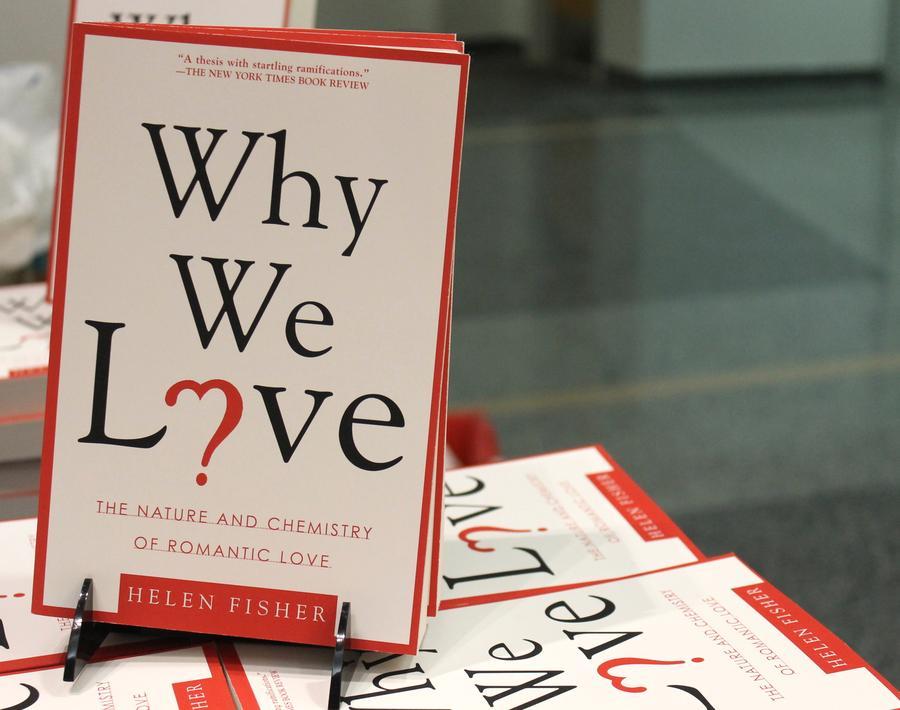
As one of the leading experts on the biology of love and attraction, psychologist and anthropologist Helen Fisher had an audience at the Monsanto Auditorium enthralled while she shared findings from her love-based research Friday night.
Fisher was a part of the Life Sciences & Society symposium, The Science of Love, in which presentations and speakers were featured to share research about the biology and chemistry behind love and attraction with MU.
Walter Gassmann, interim director of the Bond Life Sciences Center, said this weekend-long symposium is meant to connect with the public and explain why this research is important and applies to everyone. Gassmann said that everyone feels love and Fisher explained that further during her speech. Everyone is affected by love, she said.
Fisher worked with match.com in 2005 when she was hired to create chemistry.com, which combined hormone and personality-based matching systems.
She said she went into the field of pairing people up and sharing her knowledge because she wanted her work to be useful. While she was originally studying to be a social worker, she decided her goal with her work was to help people in large numbers, as opposed to a “one at a time” approach.
Fisher began her speech by explaining that nearly all humans fall in love. This dates back to Neanderthals and the first people to walk the Earth.
“[Love is] one of the most powerful brain systems the human animal has evolved,” she said.
And these feelings are not specific to any age, sex or gender, she said. The earliest person Fisher met that was in love was a 2-year-old boy who was infatuated with a girl in his class.
Romantic love is linked to a sense of attachment that is triggered through the chemicals oxytocin and vasopressin in the brain. This feeling can also be connected to sex drive. Most “one-night stands” are not as meaningless as they are intended to be, she said.
One of Fisher’s main research points was whether or not technology has changed how people love. The answer is no, she said. If anything, online dating and dating websites play a significant role in modern love.
“Whether you swipe right or left on Tinder is not going to change feelings of intense, romantic love,” she said. “It’s a basic brain system.”
The feeling of love is similar to thirst and hunger, she said, and presents itself almost as a natural survival instinct.
“If we survive another million years as species, we will continue to fall in love,” she said.
While dating sites like match.com have not changed how humans love, they have changed how humans date. There are new rules and taboos, as well as new forms of communication in the form of emojis and texting, for example.
But Fisher doesn’t see dating sites as sites that facilitate dating, really. They’re more like introducing sites, she said. People need the real-life connection to fully understand who this other person is. A matching system, even the best one in the world, isn’t always right.
“The only true algorithm is your own brain,” Fisher said.
She has also noticed a major shift in humans regarding fidelity. It used to be that marriage was the beginning of a relationship, she said, and now it’s the “finale.”
She mostly sees this among young couples, who will often have sex and live together casually before tying the knot. At first, Fisher saw this as “reckless,” but she found data that supported the notion that almost 70 percent of young couples are terrified of divorce and its implications.
Fisher said she now understands these people aren’t reckless, but cautious. They need to be completely sure of their relationship before making it permanent and will therefore extend the pre-commitment stage.
Even still, most adults marry. By age 49, 83 percent of men and 89 percent women are married, according to Fisher’s research. Fisher surveyed adults who were recently in love and claimed to be in love long term, as well as people who felt rejected by love.
“Love will win,” she said. “Most adult Americans will get married and that desire for romantic love will catch up with them.”
Along with this, many long-term married couples still feel the same as they did when they first married their spouse.
According to Fisher’s study, 75 percent of these couples are “still very much in love” and 81 percent said they would remarry their spouse.
While much of Fisher’s data stems from the U.S., she said she’s observed similar findings in China.
“Everywhere in the world, people love,” she said.
Fisher also explained the different brain chemicals that can build up a person and the way they love.
Each person has different levels of dopamine, serotonin, testosterone and estrogen and will express higher levels in one or two of these. In addition, people also attract different mates depending on how their chemical levels vary.
For example, a person with high dopamine levels, meaning they tend to be more spontaneous and free thinking, will be attracted to another person with equally high dopamine levels.
Fisher finished her speech by explaining that she doesn’t think relationships should adhere to the golden rule, in which one treats others the way they want to be treated. Instead, she explained, people should treat their romantic partners how their partner wants to be treated.
Also, she said people should take into consideration what their romantic partners bring to the table as well as what they do not.
“[A relationship is] not just what you are,” Fisher said. “It’s also what you’re not.”
_Edited by Olivia Garrett | [email protected]_